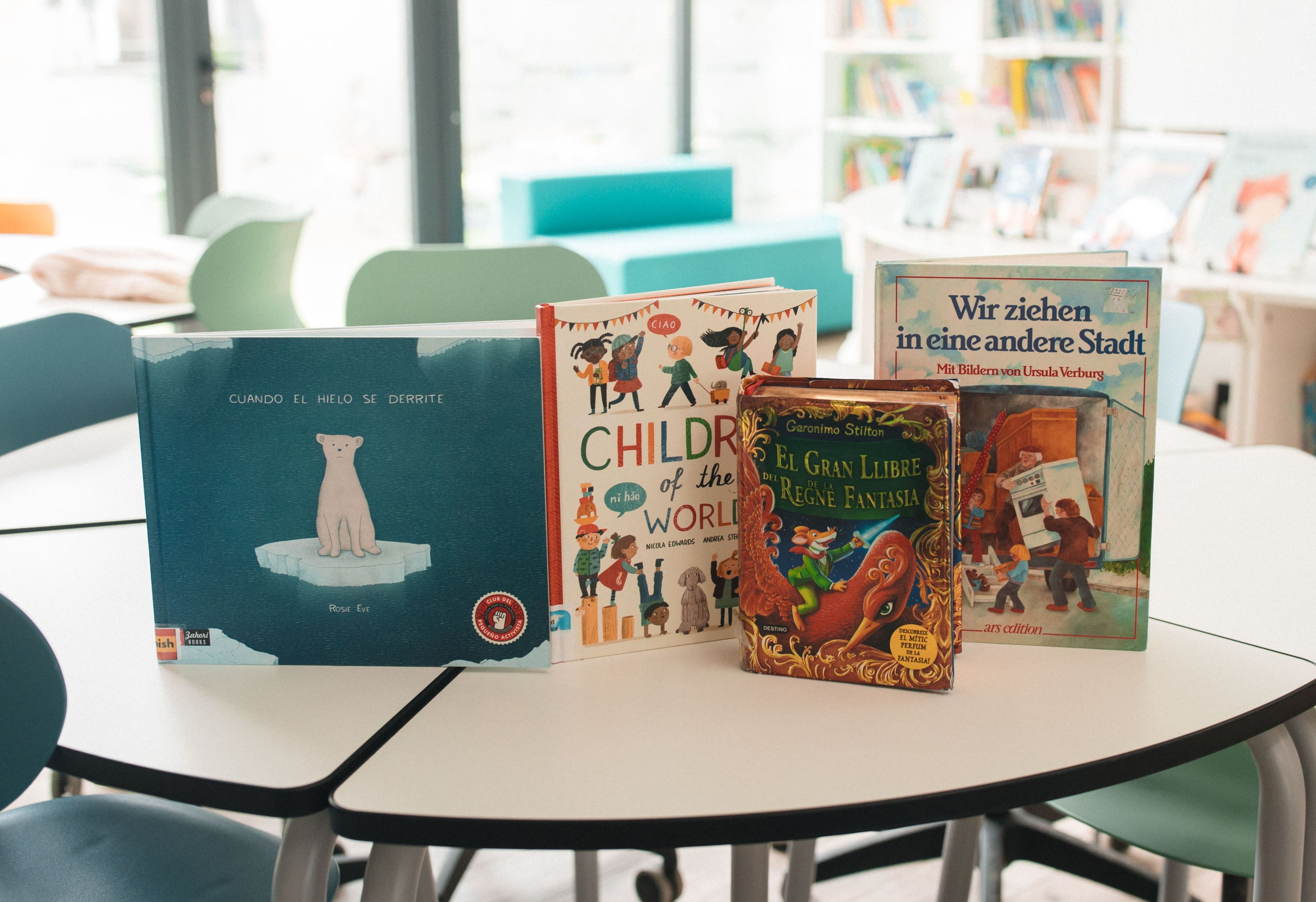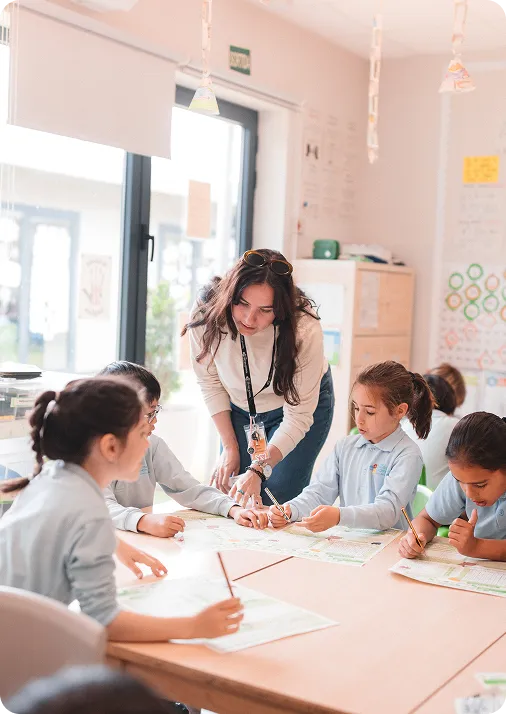
En BSCD, el proyecto lingüístico va más allá de aprender diferentes idiomas. Aunque el entorno escolar está diseñado para la inmersión en inglés, animamosa las familias a reforzar su(s) lengua(s) materna(s) en casa, ya que el desarrollo de la lengua materna es fundamental para aprender cualquier otro idioma adicional.
En un entorno educativo con una amplia variedad de orígenes culturales, el ambiente lingüístico que se crea es realmente único. En BSCD, la lengua materna de la mayoría de nuestros alumnos/as no es el inglés por lo que nuestra metodología se centra en crear un entorno de aprendizaje inclusivo. Adaptamos las clases a las necesidades de nuestro alumnado, trabajando con ellos en grupos pequeños a diario, evalúan sus necesidades y proporcionan herramientas específicas para su aprendizaje. Creamos un ambiente inclusivo y de apoyo donde poder seguir desarrollando sus habilidades lingüísticas a su propio ritmo. Introducir a los niños/as en la cultura de los idiomas que se enseñan y hablan en la escuela les ayudará a entender y usar mejor sus recursos lingüísticos en un futuro.

Fomentamos el aprendizaje basado en sus intereses y en la curiosidad. Este enfoque no solo apoya su desarrollo lingüístico inmediato, sino que también fomenta su confianza, independencia y su capacidad de adaptación.
A la vez que sumergimos a nuestros alumnos/as desde el principio en el idioma inglés, nos esforzamos por proporcionar una educación multicultural y multilingüe desde los 4 meses. Nuestro enfoque se centra en el fortalecimiento y la consolidación continuos de las habilidades lingüísticas y comunicativas de los niños/as. Este enfoque va de la mano de nuestros valores escolares y nuestro objetivo de ofrecer un entorno de igualdad, diversidad e inclusión, al ofrecer múltiples acentos y diferentes maneras de trabajar, lo que refuerza nuestro compromiso con la atención individualizada para cada alumno/a
Como escuela británica, el inglés es la lengua vehicular para la comunicación dentro del aula. En coherencia con los estándares de aprendizaje y desarrollo publicados en el marco normativo y curricular, fomentamos el aprendizaje de todas las áreas impartidas en inglés en un entorno estimulante y significativo de lengua y literatura. Teniendo en cuenta el bagaje lingüístico de nuestro alumnado, atendemos las necesidades de nuestra comunidad educativa, que tiene en su gran mayoría el inglés como lengua adicional (EAL), prestando especial atención a la calidad y cantidad del input lingüístico que reciben y alcorrecto desarrollo de su producción lingüística. Los profesores crean recursos especializados y se promueve la diferenciación específica del lenguaje dentro del aula, incluyendo apoyo individualizado durante todas las demás asignaturas.
En Primaria y Secundaria, los alumnos continuarán desarrollando el inglés como lengua vehicular, y estudiarán nuestras dos lenguas locales (español y catalán), así como un idioma extranjero (alemán).
El catalán y el castellano se introducen en Year 1 y es obligatorio para todos el alumnado hasta Year 11, cuando nuestros alumnos están preparados para la validación y la convalidación de su diploma de la ESO, que incluye los requisitos del currículo de español y catalán. También se ofrece español como lengua extranjera para GCSEs (General Certification of Secundary Education).
Alemán como lengua extranjera es obligatorio a partir de Year 5. Preparamos a los alumnos para los exámenes del Marco Común Europeo de Referencia, que se realizan en el Goethe Institut. El alemán como lengua extranjera también se ofrece para GCSEs.
El especialista de cada lengua, juntamente con el Coordinador del Departamento de Lenguas, determinarán qué programas lingüísticos y sesiones de apoyo son más adecuados para cada alumno/a al comienzo del año escolar, tras una evaluación inicial. Se realiza una evaluación continua para rediseñar las intervenciones en el aula a lo largo del año. La evidencia de este progreso se registrará en el Plan Individual de Aprendizaje de Lenguas (ILLP) de aquellos alumnos/as que lo requieran.

At BSCD, language development is more than learning different languages. While the school setting is designed for English immersion, families are strongly encouraged to reinforce their first language(s) at home, as first language development is essential to the development of any additional language.
With pupils and staff stemming from a wide range of cultural backgrounds, the resulting language environment is uniquely intricate. At the BSCD, most pupils are EAL learners and because of that our approach has a strong emphasis on creating an inclusive learning environment where lessons are adapted to the needs of our pupils and teachers which have the opportunity to work with pupils in small groups daily; assessing their needs and providing targeted groups with the tools they need to succeed. We create an inclusive and supportive environment where children can continue to grow their language abilities at their own pace. We believe that the more children know about the world around them, the better their opportunities will be when they grow up. Introducing the children to the culture of all the taught and spoken languages at the school and also learning its culture will help them to better understand and use that language.
Ample opportunities are given throughout the timetable for language acquisition to occur naturally and inquiry based/interest based learning is supported through the use of Enhanced Provision (COOL Time - Choose Our Our Learning Time, etc). This approach not only supports their immediate language development but also nurtures their confidence, independence and resilience as learners.
While we immerse our children from the beginning in the English language, we strive to provide a multicultural and multilingual education to young learners from 4 months. We have been doing so since 2008 and we are starting to see very progressive and positive results. Our way focuses on the continuous strengthening and consolidation of children's linguistic and communicative skills.
This approach goes hand in hand with our school values and our aim to provide an environment of equality, diversity, and inclusion, by offering multiple accents and different points of view and reinforces our commitment to individual attention for each child.

As a British school, we follow an entirely English language curriculum, and English is the vehicular language for communication inside the classroom. In coherence with the standards for learning and development published in the statutory framework and curriculum we foster the learning of all areas of the English language in a stimulating and meaningful language and literature environment.
Taking into account the language background of our pupils, the BSCD attends to the needs of our English as an Additional Language (EAL) population, looking very closely at the quality and quantity of the language input they receive, and how the development of their language production is guided. Class teachers plan ahead for foreseeable misconceptions, create specialised resources, and language-specific differentiation within the classroom is promoted and include one-to-one support in the classroom during all other subjects.

In Primary and Secondary, pupils will continue to develop English as a vehicular language, and study our two local languages (Spanish and Catalan), as well as one foreign language (German).
Catalan and Spanish are introduced in Year 1 and it is compulsory for all pupils to attend these subjects up to Year 11. By Year 11 our pupils are ready for their ESO diploma validation, which includes Spanish and Catalan Curriculum requirements.
Spanish as a Foreign Language is also offered for (I)GCSEs.
We offer German as a foreign language starting in Primary Year 5. We prepare pupils for the Common European Reference Framework Exams which they take at Goethe Institut.
German as a Foreign Language is also offered for (I)GCSEs.
The class teacher and the Language Coordinator will determine which language programmes and support sessions are best suited for each pupil at the beginning of the school year, after a baseline assessment. Progress will be continually assessed to make the pertinent modifications throughout the year. Evidence of this progression will be recorded in the Individual Language Learning Plan (ILLP) of those pupils that require it. ILLPs will be communicated to all language practitioners involved in the pupil's education at school, and to the pupil's family.